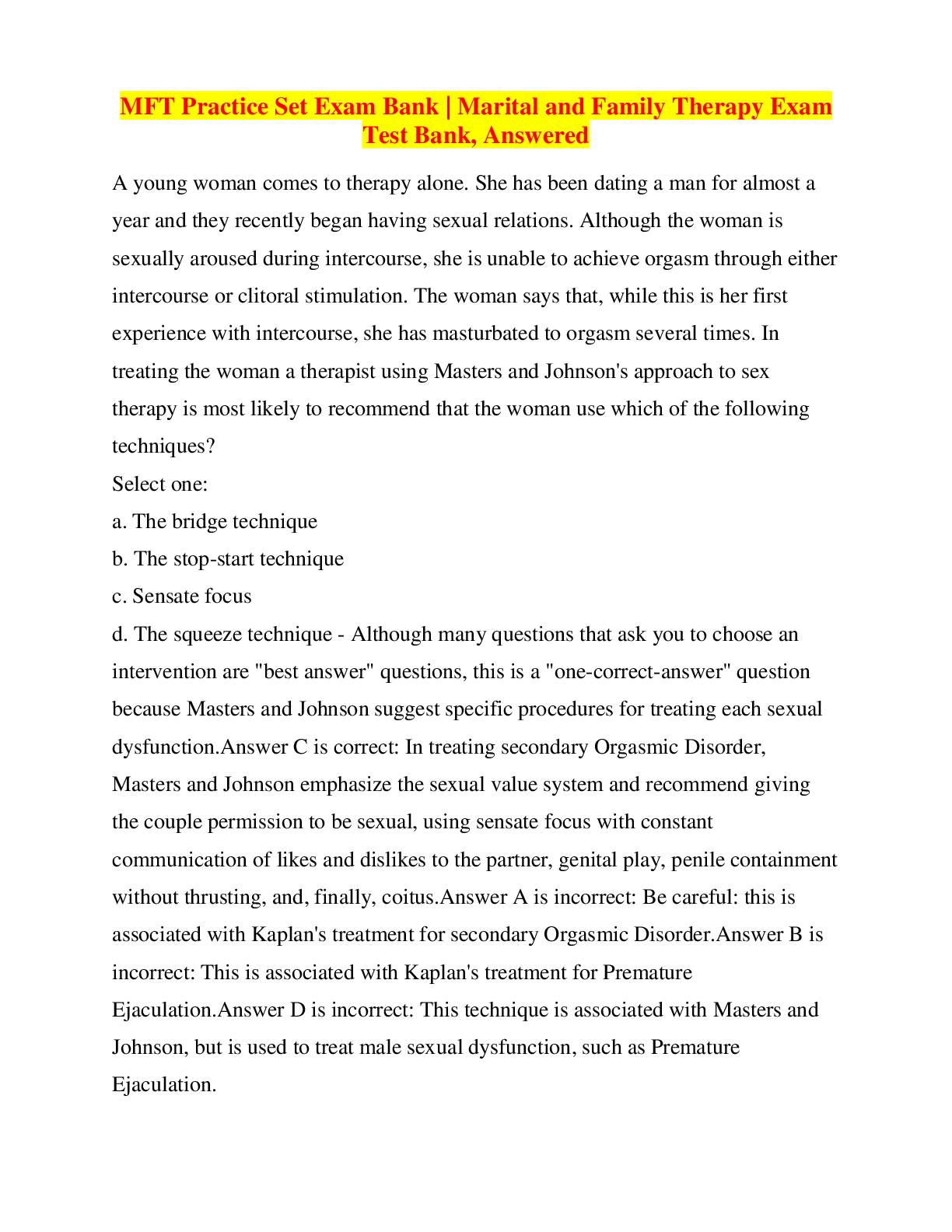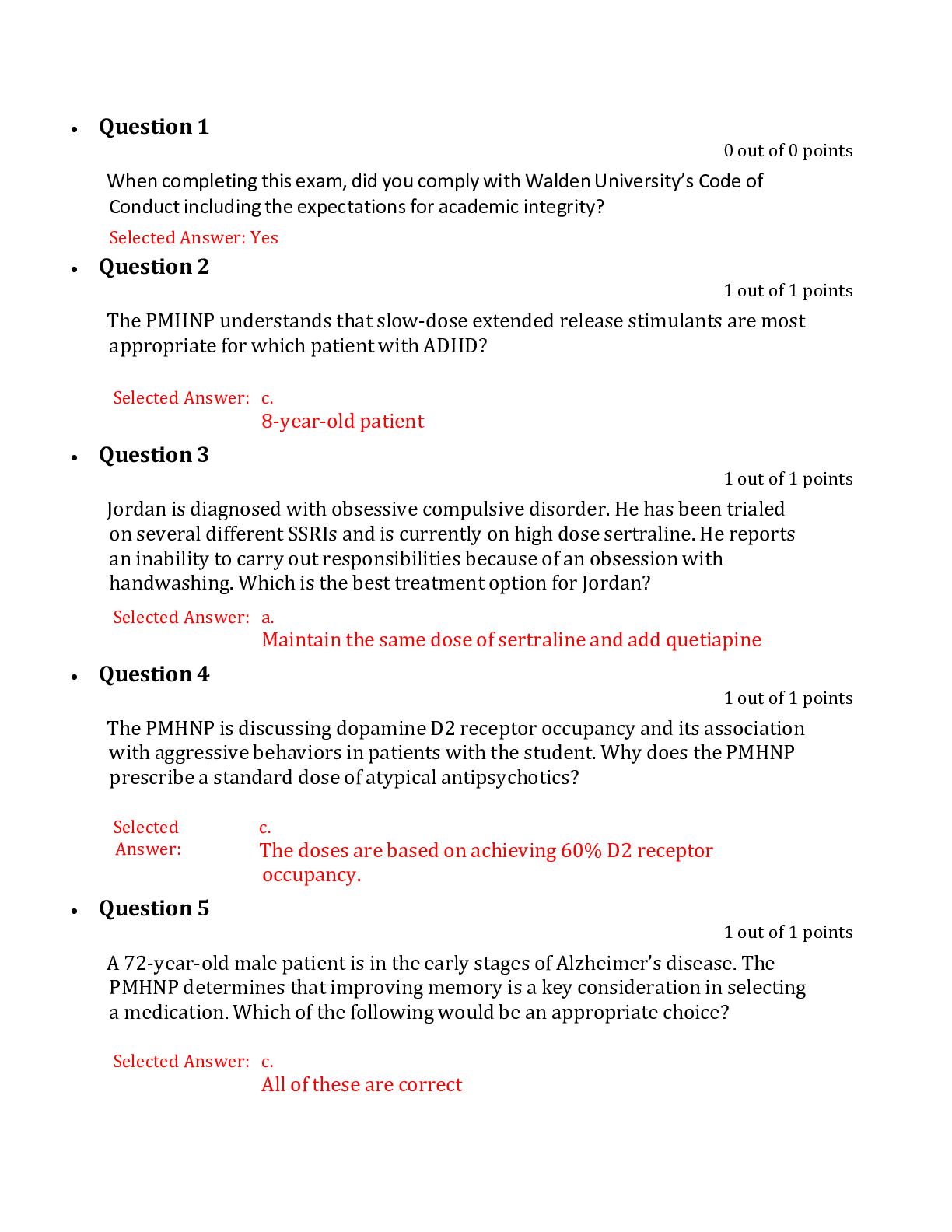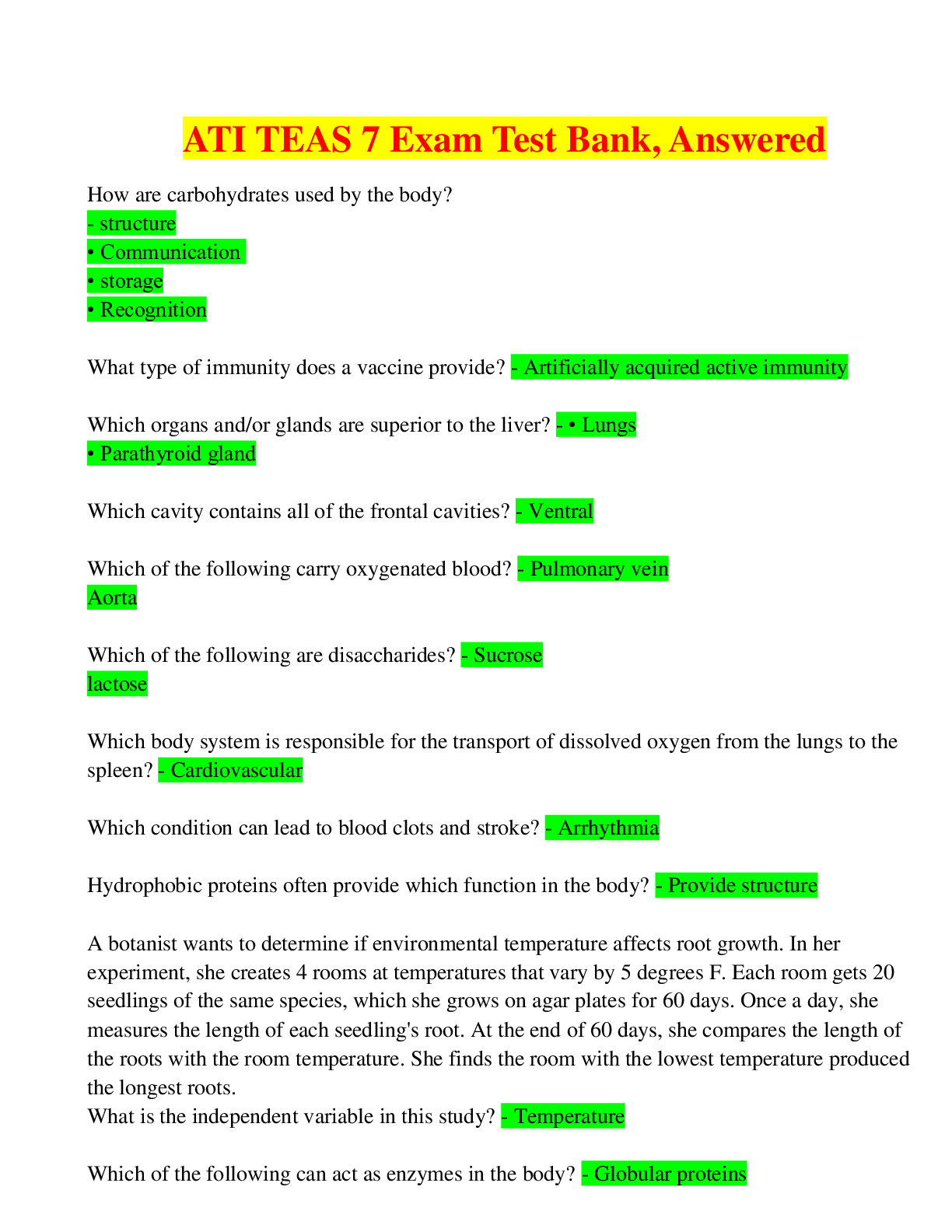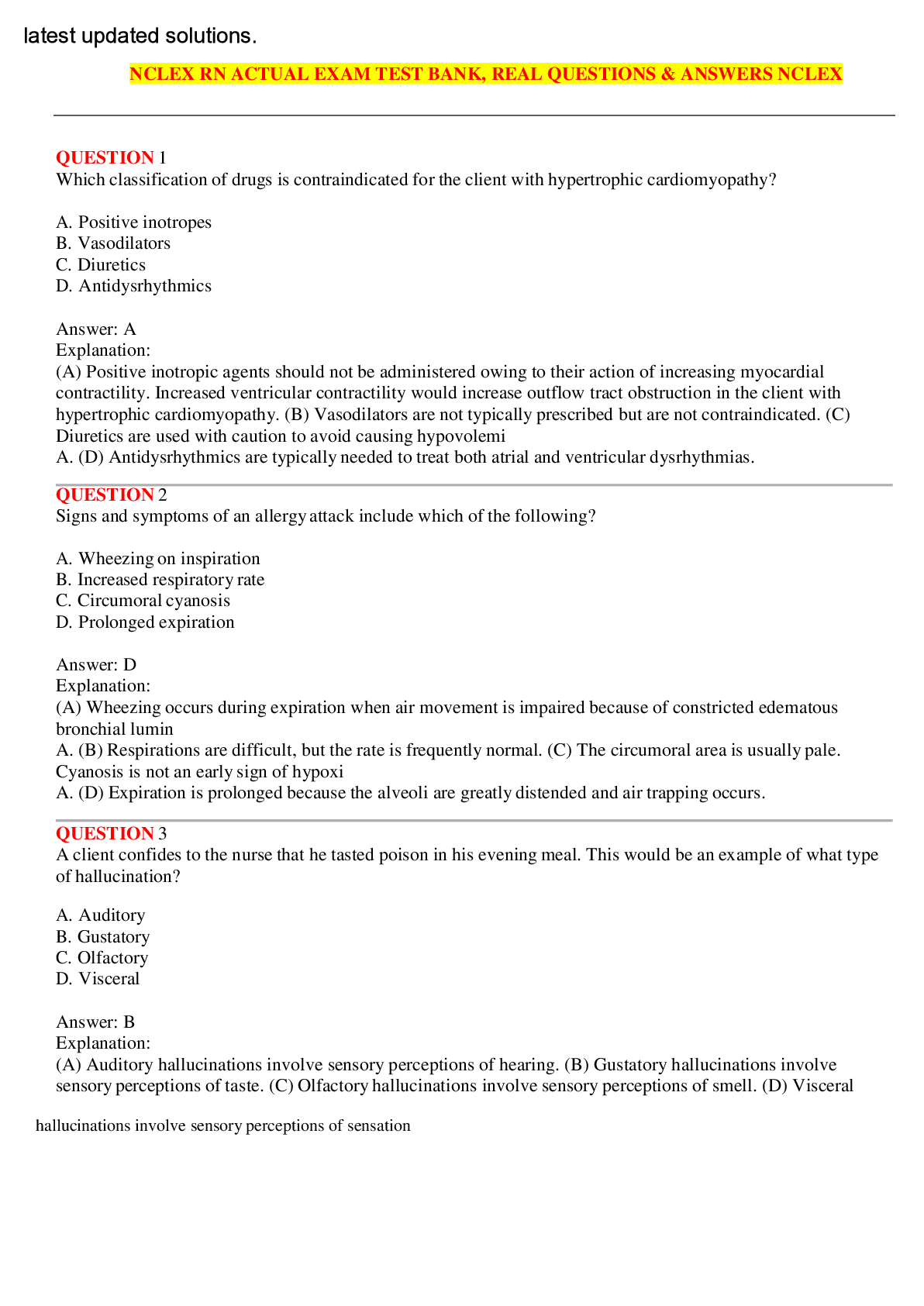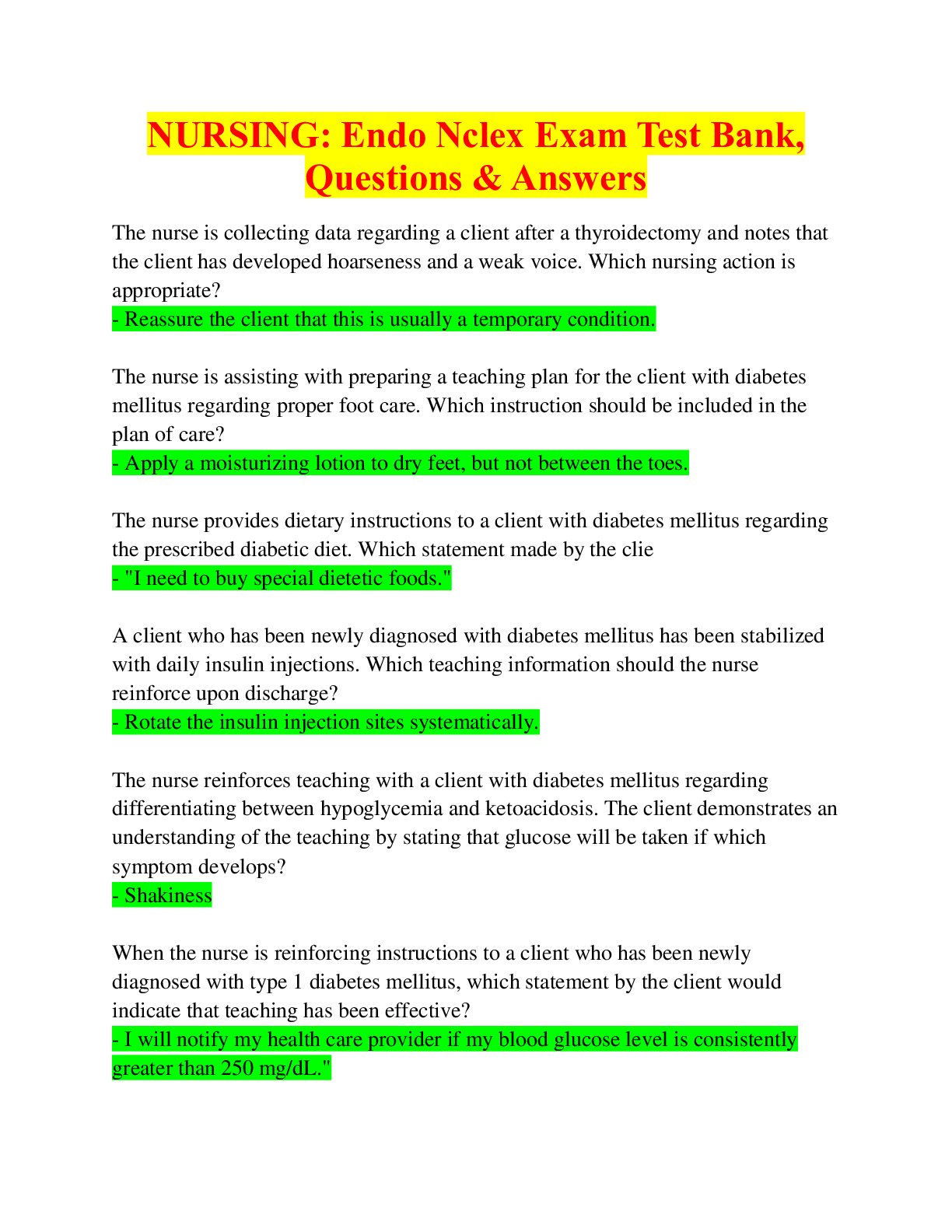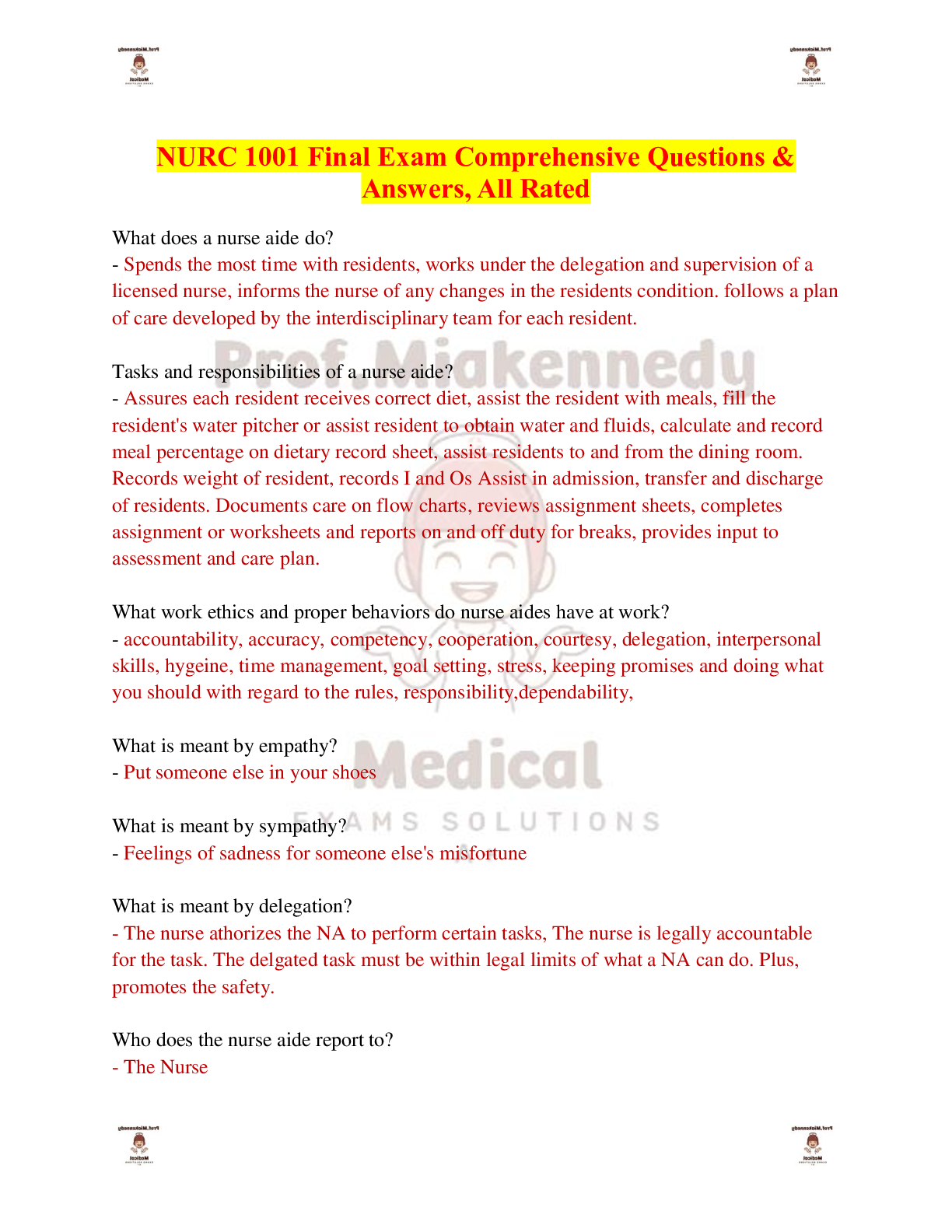*NURSING > EXAM > ATI - End-of-Life Care Final Exam Test Bank, Questions & Explained Answers, All Rated 100% (All)
ATI - End-of-Life Care Final Exam Test Bank, Questions & Explained Answers, All Rated 100%
Document Content and Description Below
ATI - End-of-Life Care Final Exam Test Bank, Questions & Explained Answers, All Rated 100%-1. The client tells the nurse, "Every time I come in the hospital you hand me one of these advance directives... (AD). Why should I fill one of these out?" Which statement by the nurse is most appropriate? 1. "You must fill out this form because Medicare laws require it." 2. "An AD lets you participate in decisions about your health care." 3. "This paper will ensure no one can override your decisions." 4. "It is part of the hospital admission packet and I have to give it to you." Colgrove, Kathryn Cadenhead. Med-Surg Success A Q&A Review Applying Critical Thinking to Test Taking (Davis's Q&A Success) (Page 668). F.A. Davis Company. Kindle Edition. - 1. 1. Advance directives (AD) are not legally required. It is a standard of the Joint Commission, and any facility which accepts federal funds must ask and offer the AD. 2. ADs allow the client to make personal health-care decisions about end-of-life issues, including cardiopulmonary resuscitation (CPR), ventilators, feeding tubes, and other issues concerning the client's death. 3. This is not a legal document guaranteed to stand up in a court of law; therefore, the client should make sure all family members know the client's wishes. 4. It is part of the hospital admission requirements, but it is not the reason why the client should complete an AD. TEST-TAKING HINT: The test taker could eliminate option "1" because the nurse cannot make the client do anything. The client has a right to say no. Option "3" is an absolute, and unless the test taker knows for sure this is correct information, the test taker should not select this option. Colgrove, Kathryn Cadenhead. Med-Surg Success A Q&A Review Applying Critical Thinking to Test Taking (Davis's Q&A Success) (Page 676). F.A. Davis Company. Kindle Edition. 2 2. The nurse is presenting an in-service discussing do not resuscitate (DNR) orders and advance directives. Which statement should the nurse discuss with the class? 1. Advance directives must be notarized by a notary public. 2. The client must use an attorney to complete the advanced directive. 3. Once the DNR is written, it can be used for every hospital admission. 4. The health-care provider must write the DNR order in the client's chart. Colgrove, Kathryn Cadenhead. Med-Surg Success A Q&A Review Applying Critical Thinking to Test Taking (Davis's Q&A Success) (Page 668). F.A. Davis Company. Kindle Edition. - 2. 1. This is not true; someone who is not family or directly involved in the client's care must witness the AD, but the document does not have to be notarized. 2. This form can be filled out without the use of an attorney; copies of an AD can be obtained at hospitals or online from various sources. 3. The DNR order must be written on each admission. 4. The HCP writes the DNR order in the client's chart, and the client completes the AD. TEST-TAKING HINT: Options "1" and "2" involve other legal entities outside the healthcare arena, which would make the test taker eliminate them. Colgrove, Kathryn Cadenhead. Med-Surg Success A Q&A Review Applying Critical Thinking to Test Taking (Davis's Q&A Success) (Page 676). F.A. Davis Company. Kindle Edition. 4 3. In which client situation would the AD be consulted and used in decision making? 1. The client diagnosed with Guillain-Barré who is on a ventilator. 2. The client with a C6 spinal cord injury in the rehabilitation unit. 3. The client in end-stage renal disease who is in a comatose state. 4. The client diagnosed with cancer who has Down syndrome. Colgrove, Kathryn Cadenhead. Med-Surg Success A Q&A Review Applying Critical Thinking to Test Taking (Davis's Q&A Success) (Page 668). F.A. Davis Company. Kindle Edition. - 3. 1. A client diagnosed with Guillain-Barré syndrome is mentally competent, and being on a ventilator does not indicate the client has lost his or her decision-making capacity. 2. A client in the rehabilitation unit would be alert, and spinal cord injuries do not cause the client to lose decision-making capacity. 3. The client must have lost decision-making capacity as a result of a condition which is not reversible or must be in a condition specified under state law, such as a terminal, persistent vegetative state; an irreversible coma; or as specified in the AD. 4. A client with Down syndrome may have some mental challenges, but unless the client has been declared legally incompetent in a court of law, the client can complete an AD and participate in his/her own case. TEST-TAKING HINT: If the test taker knows what an AD is, then the words "end-stage" and "comatose" would lead the test taker to select option "3" as a correct answer. Remember, clients with congenital or genetic disorders are not incompetent, even if they are mentally challenged. Colgrove, Kathryn Cadenhead. Med-Surg Success A Q&A Review Applying Critical Thinking to Test Taking (Davis's Q&A Success) (Page 676). F.A. Davis Company. Kindle Edition. 3 4. The nurse is moving to another state which is part of the multistate licensure compact. Which information regarding ADs should the nurse be aware of when practicing nursing in other states? 1. The laws regarding ADs are the same in all the states. 2. Advance directives can be transferred from state to state. 3. A significant other can sign a loved one's advance directive. 4. Advance directives are state regulated, not federally regulated. Colgrove, Kathryn Cadenhead. Med-Surg Success A Q&A Review Applying Critical Thinking to Test Taking (Davis's Q&A Success) (Page 668). F.A. Davis Company. Kindle Edition. - 4. 1. Individual states are responsible for specific legal requirements for ADs. 2. Moving from one state to another does not nullify or honor the AD; the nurse must be aware of the individual state's requirements. 3. Only the individual can complete and sign an AD. The significant other may be asked to implement the AD. 4. The state determines the definition of terms and requirements for an AD; individual states are responsible for specific legal requirements for ADs. TEST-TAKING HINT: The test taker should know the registered nurse must obtain a copy of the Nurse Practice Act of the state he or she is practicing in. The test taker should realize every state has different regulations regarding ADs and other health-care issues. Option "4" is the only option which reflects this thought. Colgrove, Kathryn Cadenhead. Med-Surg Success A Q&A Review Applying Critical Thinking to Test Taking (Davis's Q&A Success) (Page 676). F.A. Davis Company. Kindle Edition. 4 5. Which client would be most likely to complete an advance directive? 1. A 55-year-old Caucasian person who is a bank president. 2. A 34-year-old Asian licensed practical nurse. 3. A 22-year-old Hispanic lawn care worker. 4. A 65-year-old African American retired cook. Colgrove, Kathryn Cadenhead. Med-Surg Success A Q&A Review Applying Critical Thinking to Test Taking (Davis's Q&A Success) (Page 668). F.A. Davis Company. Kindle Edition. - 5. 1. ADs are more frequently completed by white, middle- to upper-class individuals. 2. Many nurses do not have ADs, although they discuss them with clients daily. 3. Culturally, Hispanics allow their family members to make decisions for them. 4. Many cultures, including the African American culture, often distrust the health-care system and believe necessary care will be withheld if an AD is completed. TEST-TAKING HINT: If the test taker were not aware of the research, the test taker could examine the occupations and ask themselves, "Which client would want to direct his or her own care and make his or her own decisions?" Nurses may want this but many do not have ADs. Colgrove, Kathryn Cadenhead. Med-Surg Success A Q&A Review Applying Critical Thinking to Test Taking (Davis's Q&A Success) (Page 677). F.A. Davis Company. Kindle Edition. 1 6. The client with an AD tells the nurse, "I have changed my mind about my AD. I really want everything possible done if I am near death since I have a grandchild." Which action should the nurse implement? 1. Notify the health information systems department to talk to the client. 2. Remove the AD from the client's chart and shred the document. 3. Inform the client he or she has the right to revoke the AD at any time. 4. Explain this document cannot be changed once it is signed. Colgrove, Kathryn Cadenhead. Med-Surg Success A Q&A Review Applying Critical Thinking to Test Taking (Davis's Q&A Success) (Page 668). F.A. Davis Company. Kindle Edition. - 6. 1. This department has nothing to do with the AD. 2. The most appropriate action would be for the nurse to have the client write on the AD he or she is revoking the document; the nurse cannot shred legal documents from the client's chart. 3. The client must be informed the AD can be rescinded or revoked at any time for any reason verbally, in writing, or by destroying his or her own AD. The nurse cannot destroy the client's AD, but the client can destroy his or her own. 4. This is an incorrect answer because the client always has the right to change his or her mind. TEST-TAKING HINT: Option "4" can be eliminated by remembering statements with absolutes should not be selected as correct answers unless the test taker knows for sure the answer is correct. The client's chart is a legal document, and these papers cannot be shredded or altered by using anything that obscures the writing or by erasing information. Colgrove, Kathryn Cadenhead. Med-Surg Success A Q&A Review Applying Critical Thinking to Test Taking (Davis's Q&A Success) (Page 677). F.A. Davis Company. Kindle Edition. 3 7. The client has just signed an AD at the bedside. Which intervention should the nurse implement first? 1. Notify the client's health-care provider about the AD. 2. Instruct the client to discuss the AD with significant others. 3. Place a copy of the advance directive in the client's chart. 4. Give the original advance directive to the client. Colgrove, Kathryn Cadenhead. Med-Surg Success A Q&A Review Applying Critical Thinking to Test Taking (Davis's Q&A Success) (Page 668). F.A. Davis Company. Kindle Edition. - 7. 1. The HCP should be made aware of the AD, but this is not the first intervention. 2. This is the most important intervention because the legality of the document is sometimes not honored if the family members disagree and demand other action. If the client's family is aware of the client's wishes, then the health-care team can support and honor the client's final wishes. 3. Copies of the AD should be placed in the chart and given to significant others, the client's attorney, and all health-care providers. 4. The original should be given to the client and a copy should be placed in the chart, but this is not the first intervention. TEST-TAKING HINT: This is a priority-setting question, and the test taker should read all the answer options and try to rank them in order of priority. Colgrove, Kathryn Cadenhead. Med-Surg Success A Q&A Review Applying Critical Thinking to Test Taking (Davis's Q&A Success) (Page 677). F.A. Davis Company. Kindle Edition. 2 8. The HCP has notified the family of a client in a persistent vegetative state on a ventilator of the need to "pull the plug." The client does not have an AD or a durable power of attorney for health care, and the family does not want their loved one removed from the ventilator. Which action should the nurse implement? 1. Refer the case to the hospital ethics committee. 2. Tell the family they must do what the HCP orders. 3. Follow the HCP's order and "pull the plug." 4. Determine why the client did not complete an AD. Colgrove, Kathryn Cadenhead. Med-Surg Success A Q&A Review Applying Critical Thinking to Test Taking (Davis's Q&A Success) (Page 668). F.A. Davis Company. Kindle Edition. - 8. 1. The ethics committee is composed of health-care workers and laypeople from the community to objectively review the situation and make a recommendation which is fair to both the client and health-care system. The family has the right to be present and discuss their feelings. 2. The nurse is legally obligated to be a client advocate. 3. This action could create a multitude of ramifications, including a lawsuit and possible criminal charges. 4. It really doesn't matter at this point why the client didn't complete an AD; the client cannot do it now. TEST-TAKING HINT: The test taker must be aware of the ethics committee and its role in helping resolve ethical dilemmas. Any answer option which has the word "why" should be evaluated closely before selecting it as the correct answer. Removing the endotracheal tube or turning off the ventilator ("pulling the plug") is a medical responsibility; therefore, option "3" could be eliminated as the correct answer. Colgrove, Kathryn Cadenhead. Med-Surg Success A Q&A Review Applying Critical Thinking to Test Taking (Davis's Q&A Success) (Page 677). F.A. Davis Company. Kindle Edition. 1 9. The client asks the nurse, "When will the durable power of attorney for health care take effect?" On which scientific rationale would the nurse base the response? 1. It goes into effect when the client needs someone to make financial decisions. 2. It will be effective when the client is under general anesthesia during surgery. 3. The client must say it is all right for it to become effective and enforced. 4. It becomes valid only when the clients cannot make their own decisions. Colgrove, Kathryn Cadenhead. Med-Surg Success A Q&A Review Applying Critical Thinking to Test Taking (Davis's Q&A Success) (Page 669). F.A. Davis Company. Kindle Edition. - 9. 1. It is a power of attorney executed by a lawyer which allows a delegated other person to make financial decisions. That document has nothing to do with a durable power of attorney for health care. 2. The client has not lost the capacity to make decisions; therefore, a durable power of attorney cannot be used by the assigned person to make decisions. 3. The client must not be able to make his or her own decisions before this document can be used. 4. The client must have lost decision-making capacity as a result of a condition which is not reversible or must be in a condition which is specified under state law, such as a terminal, persistent vegetative state; an irreversible coma; or as specified in the AD. TEST-TAKING HINT: The test taker should not confuse a power of attorney and a durable power of attorney for health care. These are two separate, yet very important, documents with similar names. Colgrove, Kathryn Cadenhead. Med-Surg Success A Q&A Review Applying Critical Thinking to Test Taking (Davis's Q&A Success) (Page 678). F.A. Davis Company. Kindle Edition. 4 [Show More]
Last updated: 6 months ago
Preview 5 out of 116 pages

Loading document previews ...
Buy this document to get the full access instantly
Instant Download Access after purchase
Buy NowInstant download
We Accept:

Reviews( 0 )
$14.50
Can't find what you want? Try our AI powered Search
Document information
Connected school, study & course
About the document
Uploaded On
Sep 25, 2024
Number of pages
116
Written in
Additional information
This document has been written for:
Uploaded
Sep 25, 2024
Downloads
0
Views
23

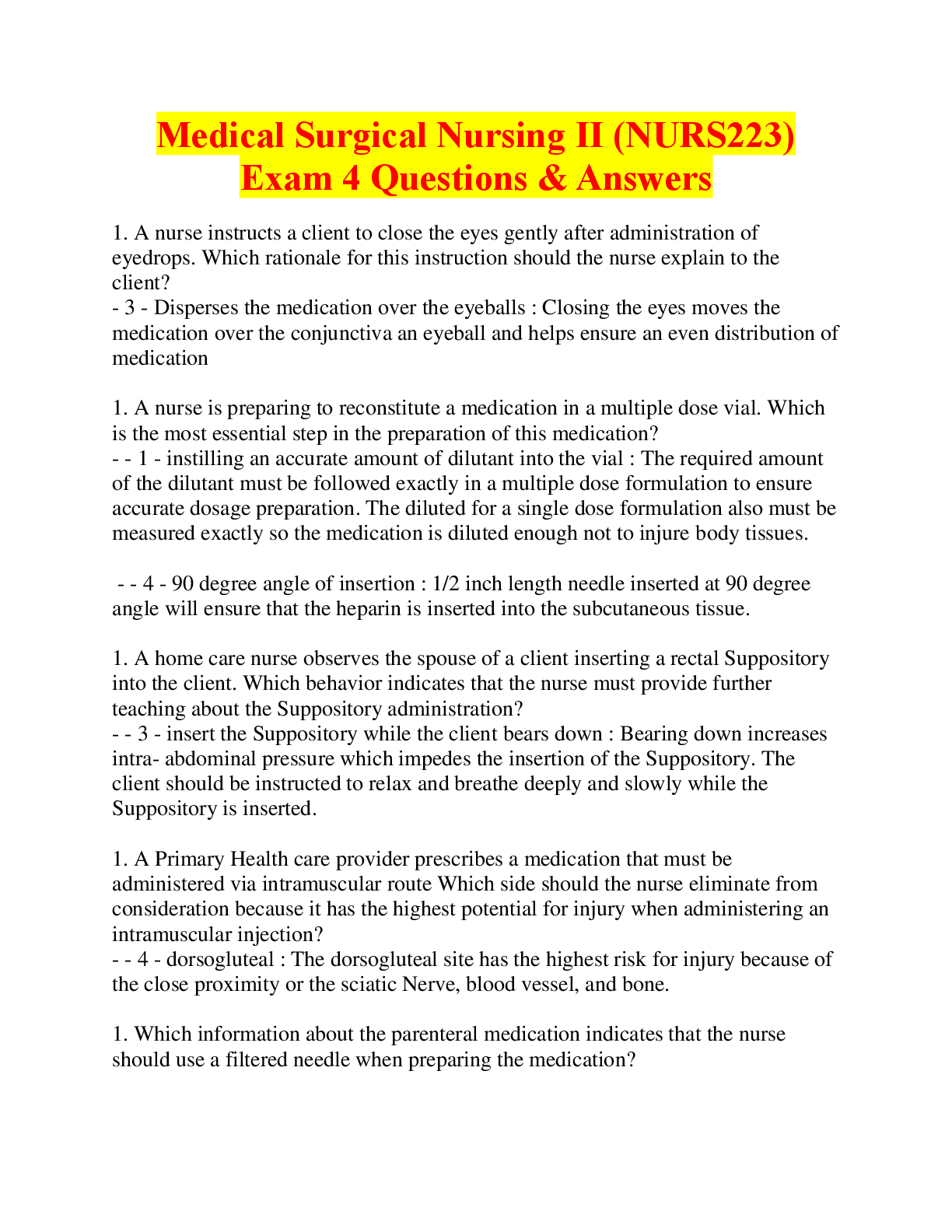
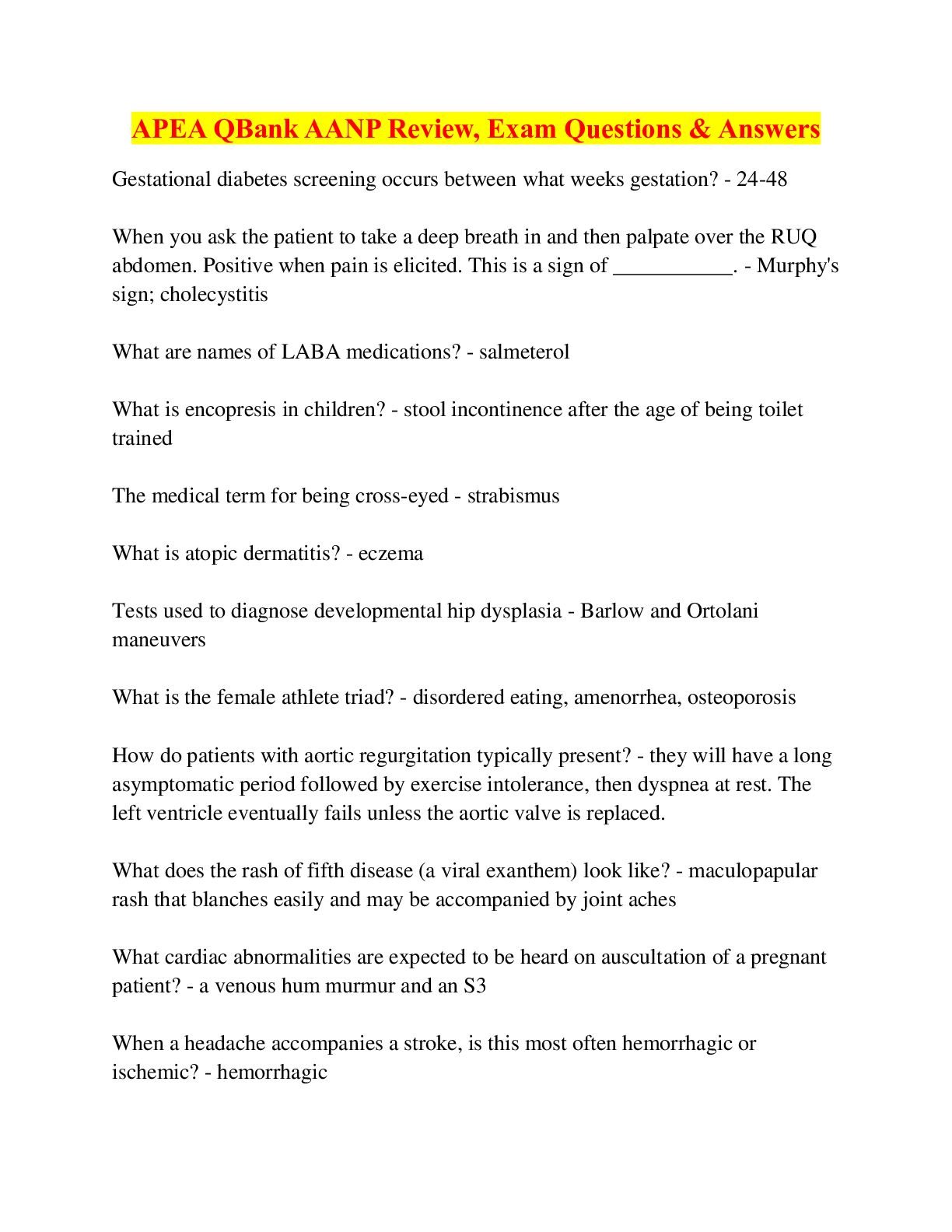
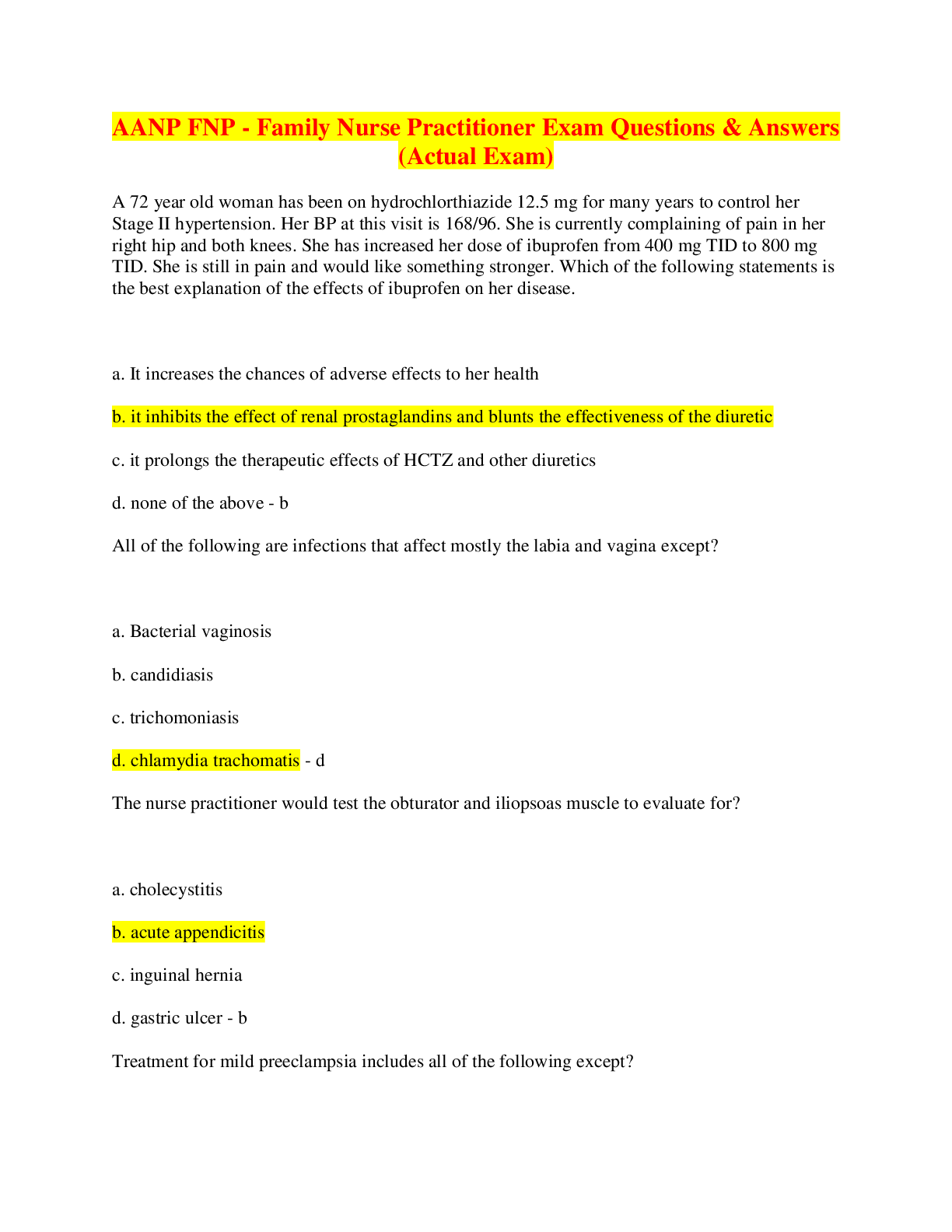

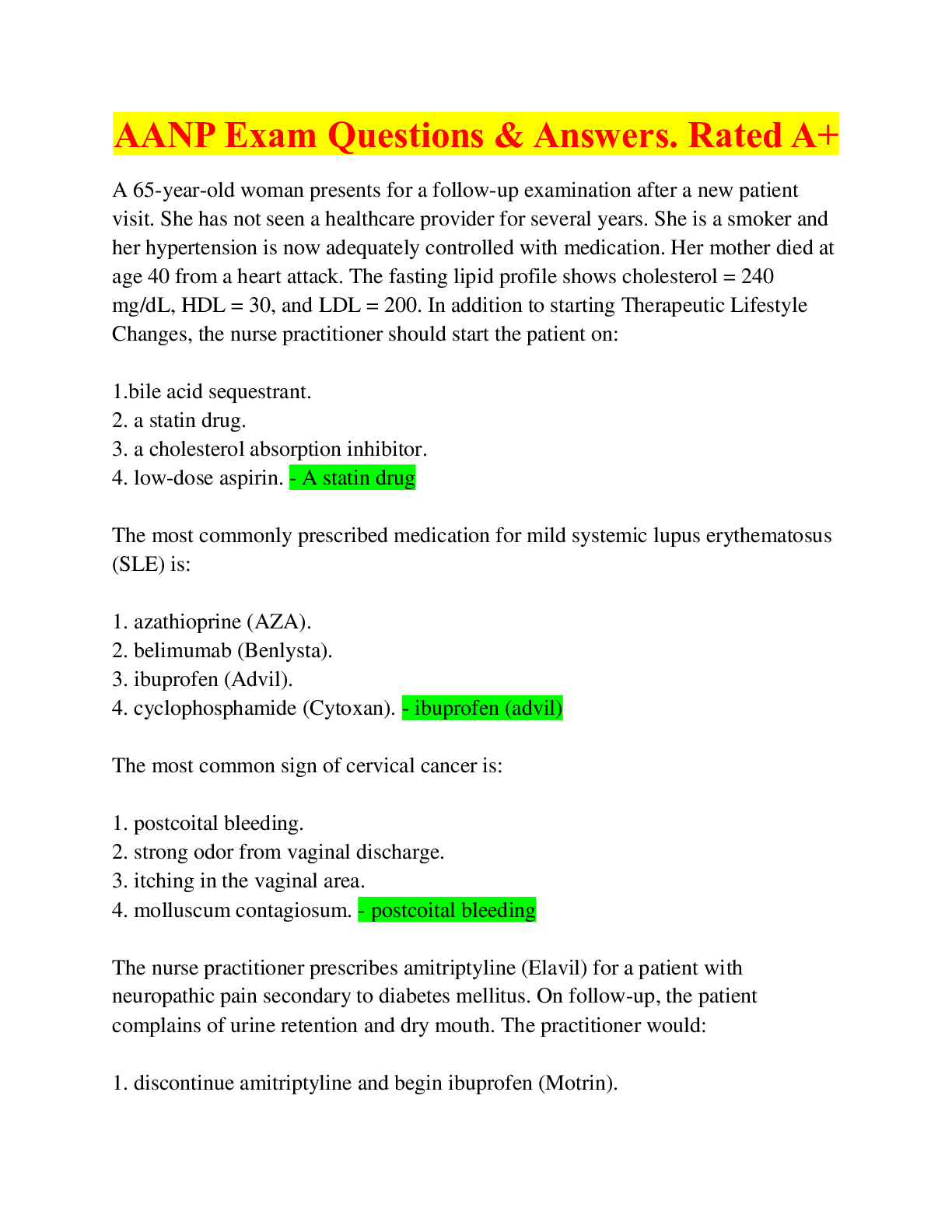

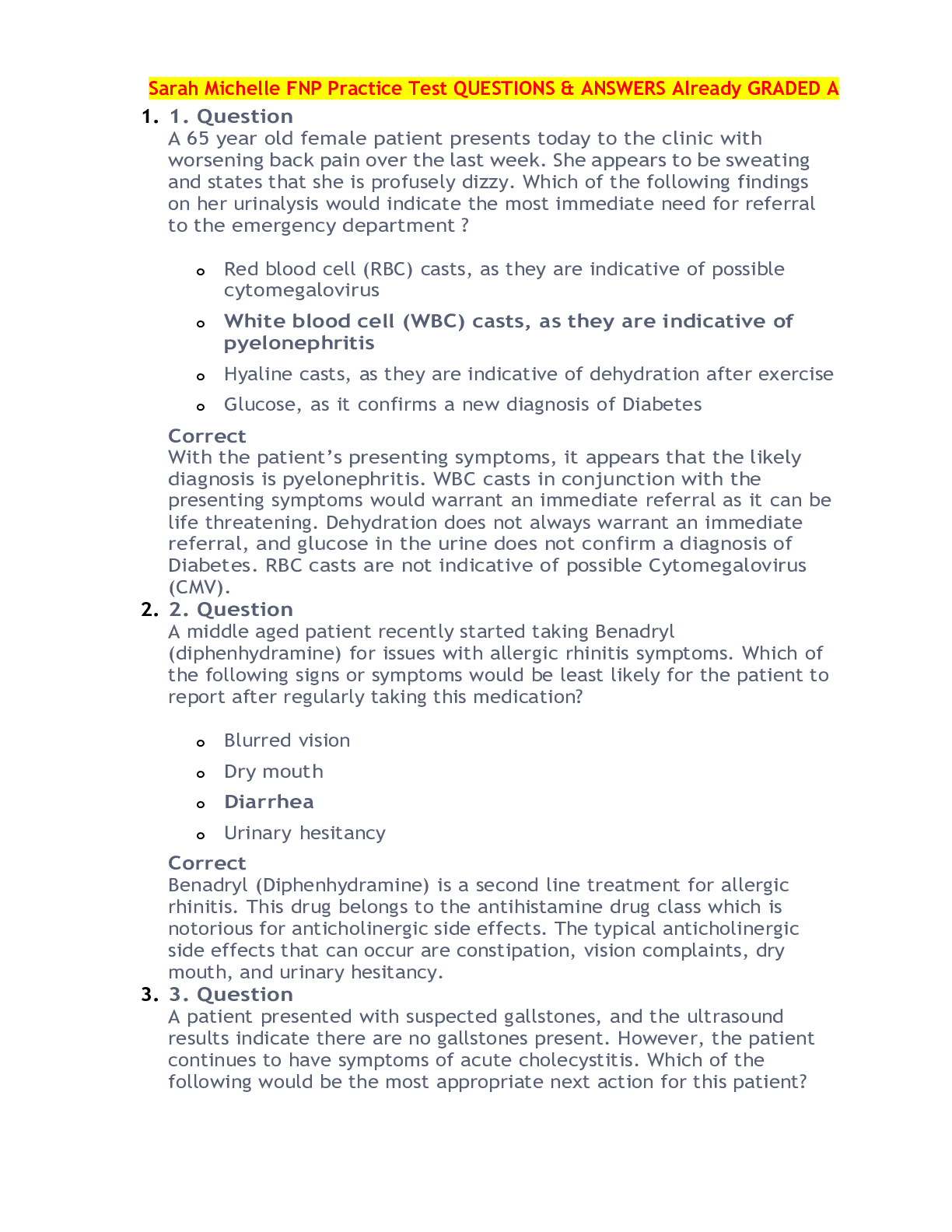
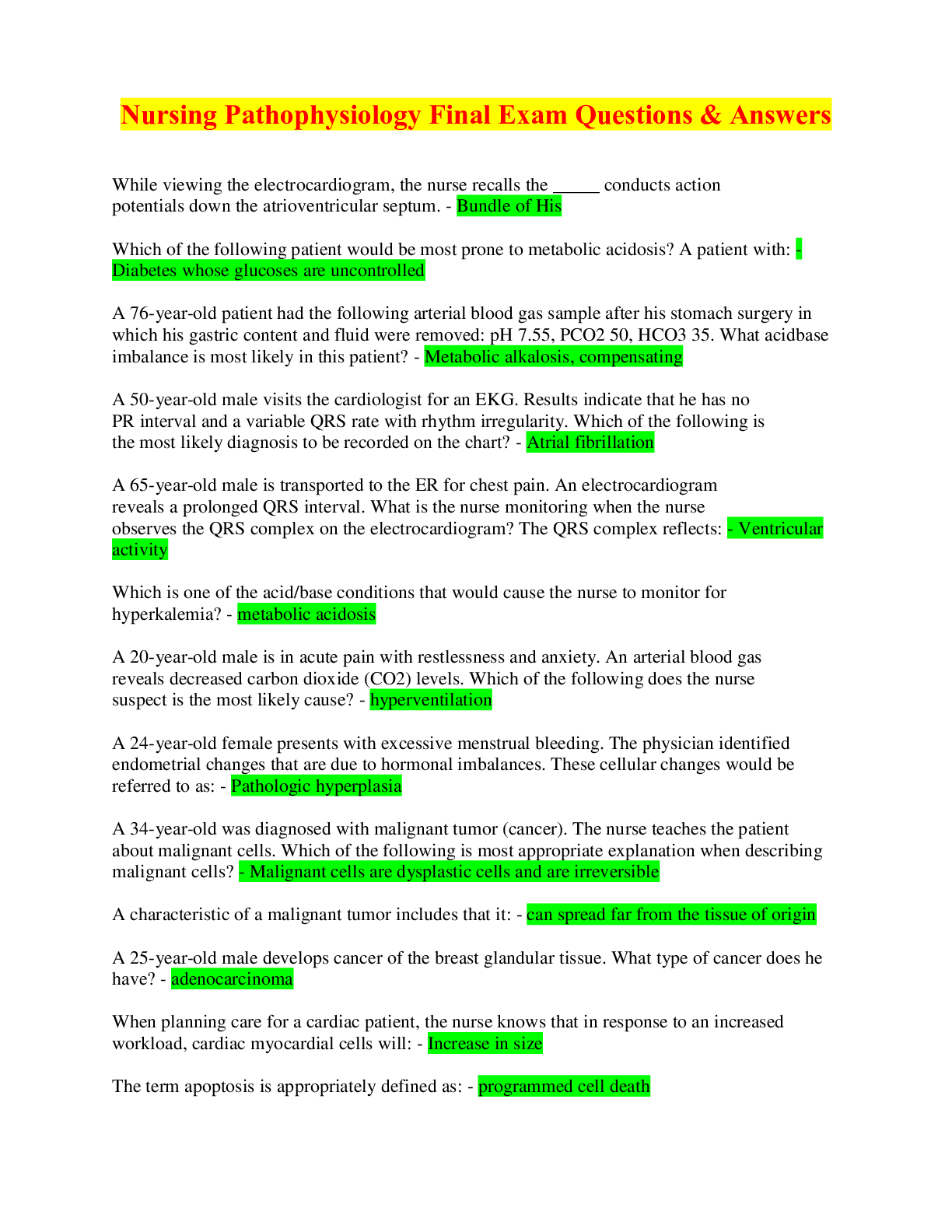
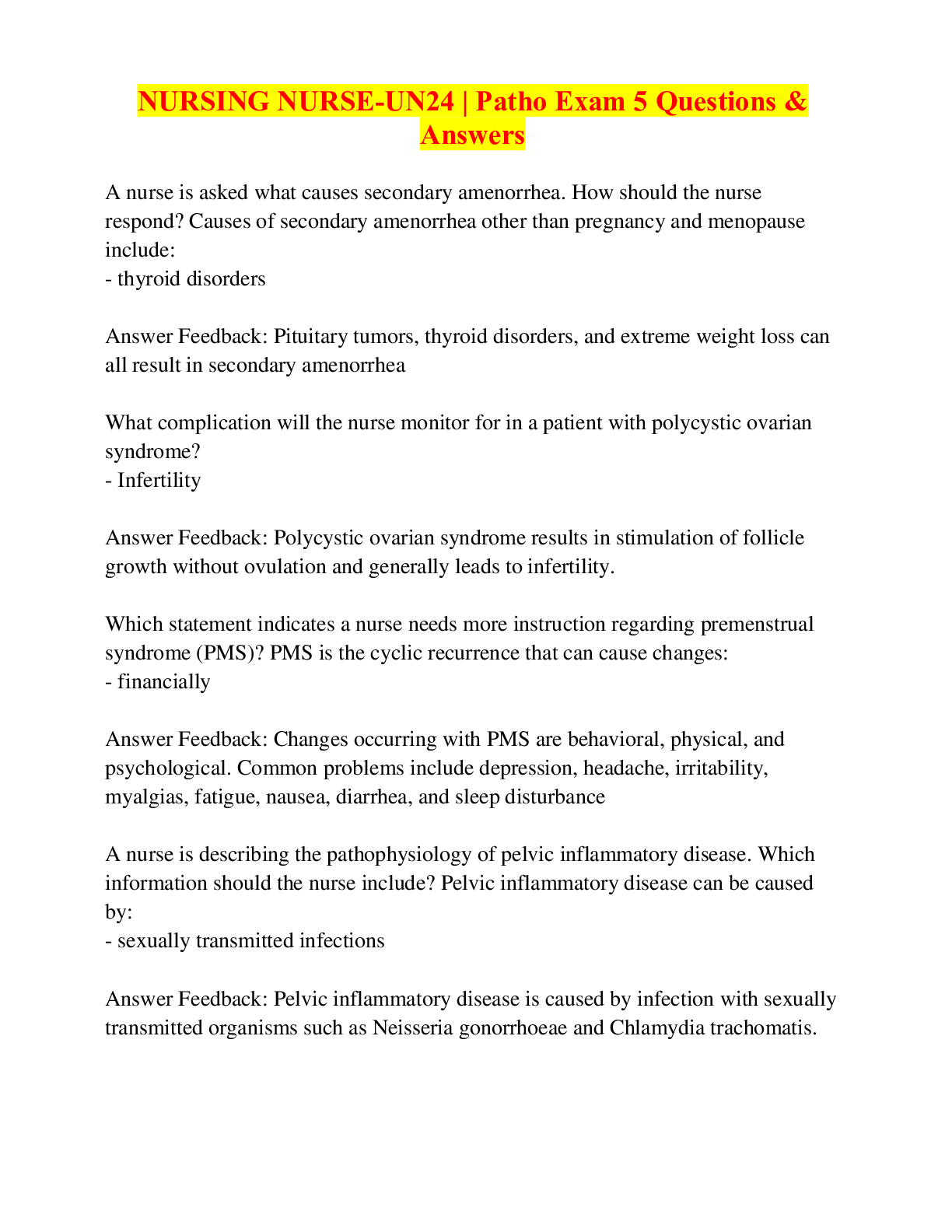

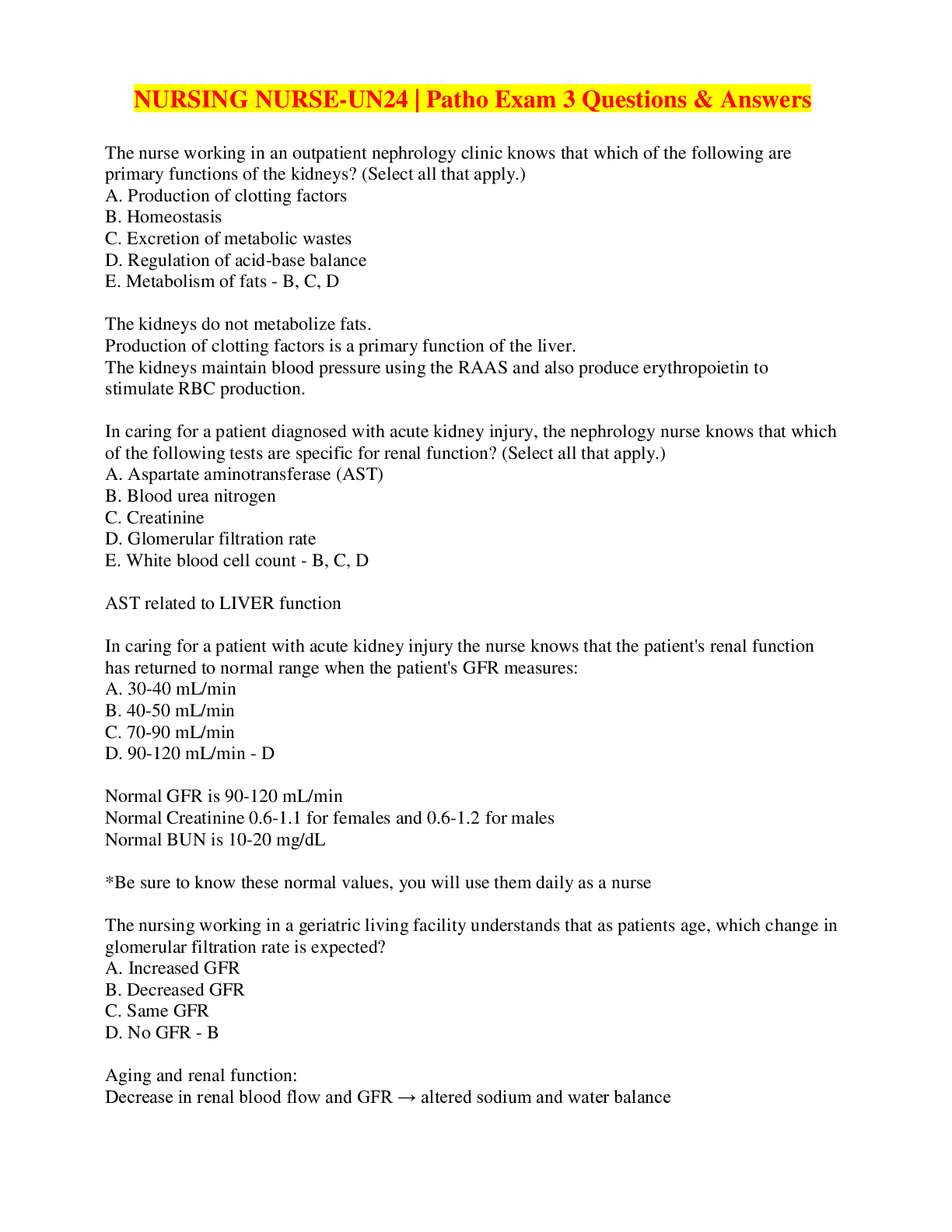
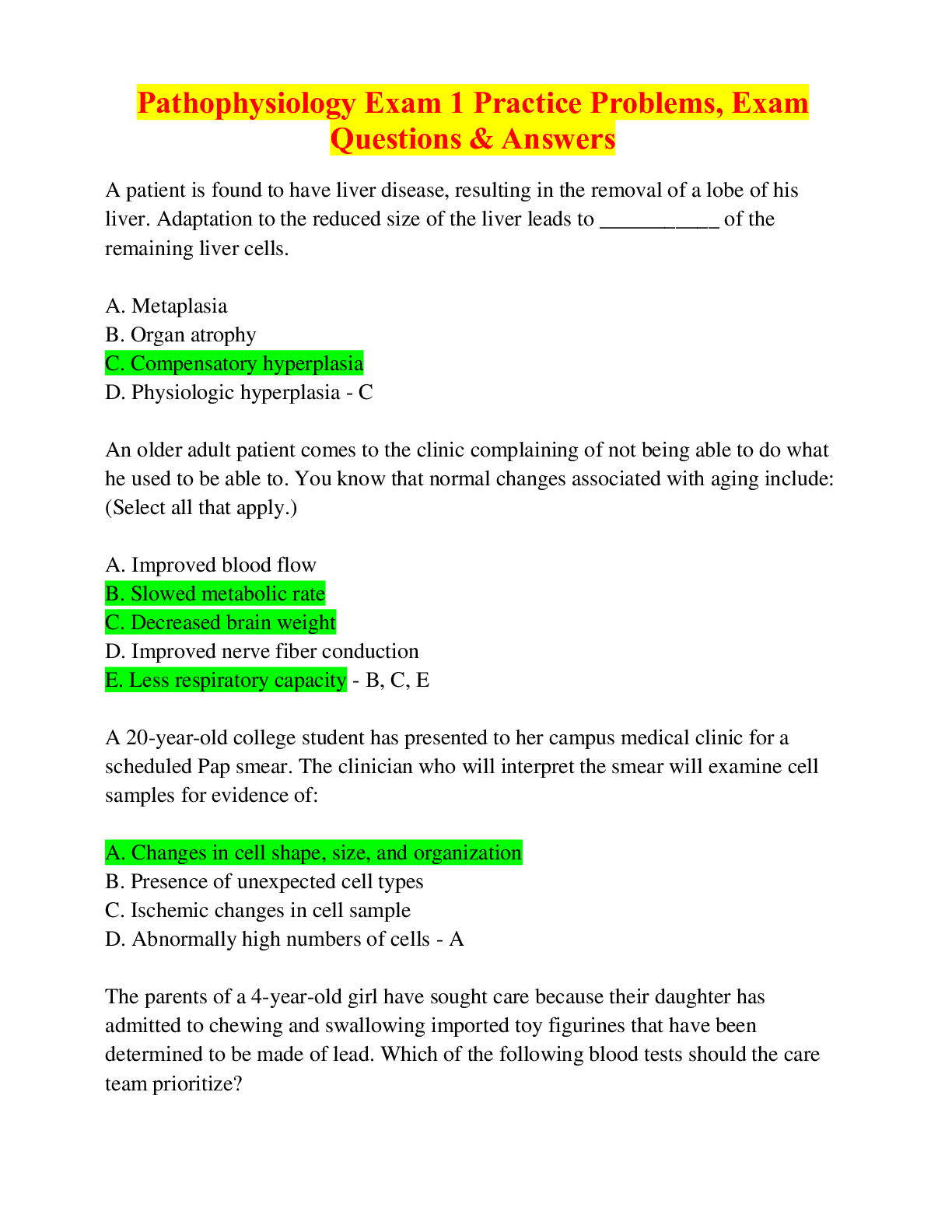


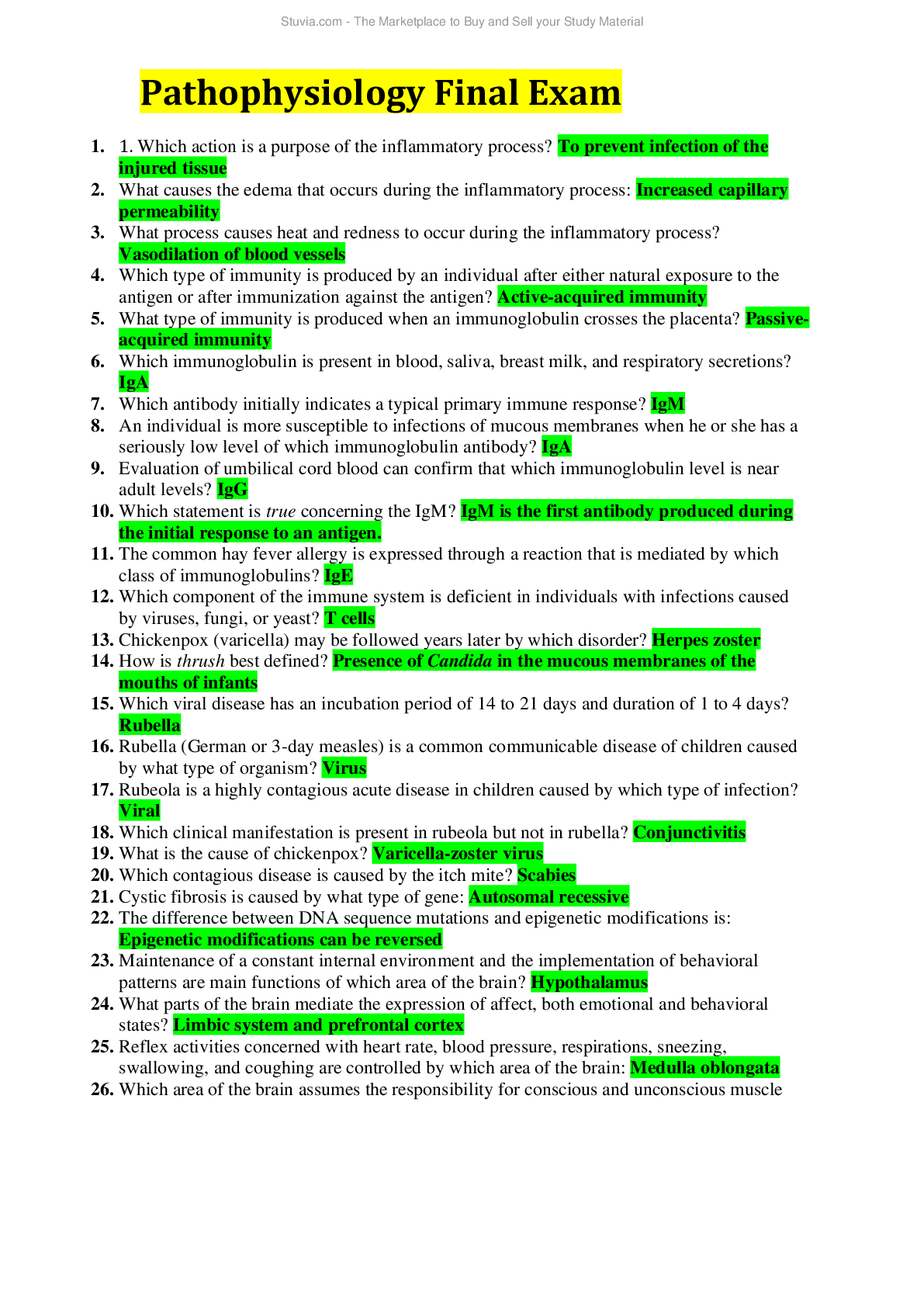
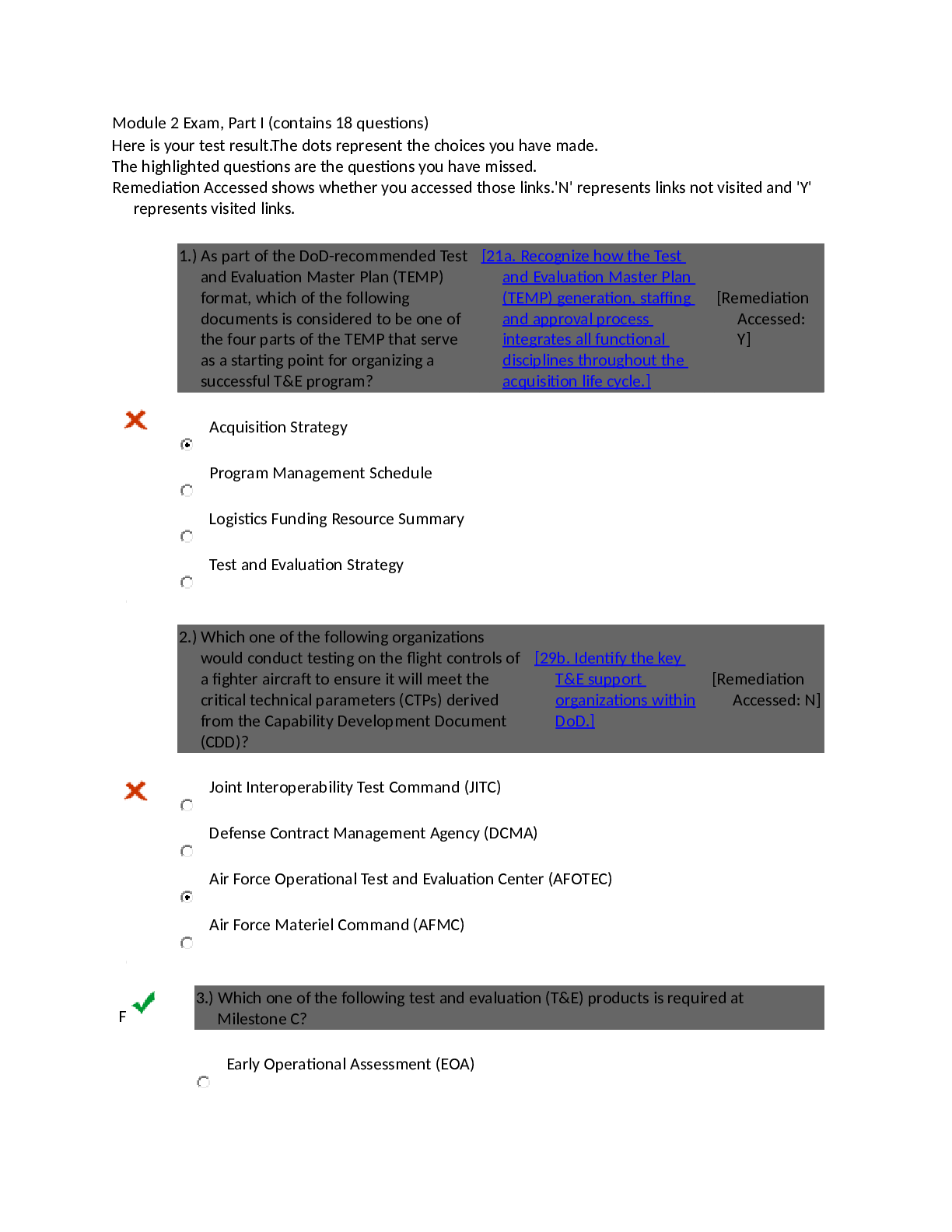
 (Verified Answers).png)
